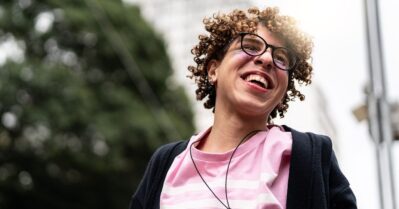Urban Alliance: Connecting Youth of Color With Internship Opportunities

Along with sharpening technical skills, internships enable students to develop professional networks and important soft skills like time management and conflict resolution. But youth of color often don’t have access to these valuable opportunities. By placing low-income high school seniors of color in paid internships, Urban Alliance provides a path for teens to attain quality jobs in the future. With support from the Annie E. Casey Foundation, Urban Alliance has successfully transitioned its High School Internship Program— which was found effective by a randomized controlled trial — to a virtual format during the pandemic.
Since 1996, Urban Alliance has worked with over 500 businesses and 100 schools to provide more than 5,700 young people with paid internships and more than 22,000 others with professional development training. Each fall, Urban Alliance pairs high school seniors of color from Baltimore, Chicago, Washington, D.C., northern Virginia, and Detroit with one of over 200 partner organizations, ranging from Fortune 500 companies to hotels to government agencies. Traditionally, students complete six weeks of job skills training with Urban Alliance before beginning their paid, part-time internships; then, in the summer after high school graduation, they transition to full-time work.
In Urban Alliance’s training program, students learn workplace fundamentals that their more affluent peers often take for granted, like professional communication and teamwork. During the internships, students work closely with their workplace supervisor (“mentor”) and their Urban Alliance program coordinator to ensure they are meeting program goals.
What sets the Urban Alliance High School Internship program apart? Ninety-nine percent of participants are students of color, and most have a grade point average that falls between 2.0 and 3.0. Instead of focusing on high-achieving students as many advancement programs do, Urban Alliance serves mid-achieving students who often graduate high school without a job or plans to attend college despite their potential. By recruiting this group of students for their internship program, Urban Alliance prevents post-high school disconnection.
“We know that post-secondary attainment and success is a key part of building a brighter future, particularly for Black and brown students,” says Ayo Atterberry, senior associate in the Evidence-Based Practice Group at the Casey Foundation, who manages the Urban Alliance grant. “Urban Alliance helps create a bridge for these students to have access to social mobility and job opportunities, which paves the way for better economic outcomes.”
Pivoting during the COVID-19 pandemic
The pandemic forced Urban Alliance to adapt to a new, remote environment — and overcome several obstacles. Many of Urban Alliance’s low-income students share devices with other family members who also have to work or attend school from home, making it difficult for them to intern full time. At the same time, students need paychecks to support their families, especially in households that are struggling financially due to the pandemic. Eighty percent of Urban Alliance interns contribute a portion of their paycheck to household expenses.
To address these hurdles, Urban Alliance quickly found ways to get laptops to students in need. Instead of weekly, in-person student trainings, Urban Alliance held virtual workshops and converted its annual public speaking competition into a virtual interview challenge. Even amid the pandemic, 470 students graduated from the program this year — and Urban Alliance continues relationships with almost all of its partners.
This fall, Urban Alliance will extend the pre-internship training program through December to further prepare students for remote and hybrid internships beginning in January. For instance, the updated program will now include digital literacy topics, including best practices for teleconferencing platforms and remote communication.
An evidence-based program focused on often ignored but important skills
In a typical year, Urban Alliance sees significant success. Ninety percent of Urban Alliance’s students are accepted into college, 80 percent enroll and 80 percent persist into their sophomore year.
The internship program isn’t just about college readiness. It’s also meant to prime students with the soft skills necessary to thrive in the workplace, like adaptability, resilience and communication skills. After completing the Urban Alliance program, students retain their comfort with these skills much longer than their peers. Ninety-six percent of interns felt more at ease walking into a professional office space after completing the program, and 88 percent were better at adapting to new circumstances.
“A well-designed internship is an excellent vehicle for young people to build their social and emotional learning (SEL) skills,” says Eshauna Smith, CEO of Urban Alliance. “Research shows that if you have repetition, reflection and the ability to practice that you’re going to be able to pick up those SEL skills, which are foundational to having the right set of professional competencies to get and keep a job.”
Who Will Succeed In Tomorrow’s Job Market?, a brief published by Urban Alliance and funded by the Casey Foundation, discusses the importance of these soft skills, which employers often incorrectly assume students have mastered.
“We come at this from a belief that all young people — no matter their race, ethnicity, or background — really deserve equal access to the skills training, paid work experience and professional networks that are needed to achieve economic self-sufficiency,” says Smith. “We really try to listen to students and perform accordingly.”
Learn about a Casey grantee connecting youth in the justice system with work opportunities





